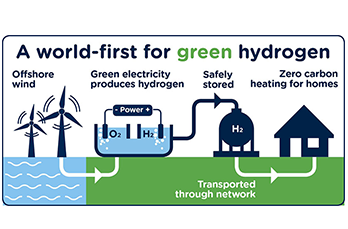We, along with the other GB gas network companies, have unveiled our plan to deliver the world’s first zero emissions gas network.
Decarbonising the gas network will be critical for the UK to meet its net zero emissions target for 2050. That is the conclusion of a major new report by Navigant, which has set out the steps that need to be taken along the pathway to deliver the world’s first net zero emissions gas network.
Navigant’s Pathways to Net Zero report for the Energy Networks Association sets out a detailed plan to decarbonise the gas network, along with clear technical, operational and regulatory actions that need to take place to achieve it.
The actions include the need for changes to gas quality and billing regulations to allow more green gases into the system, support for hydrogen trials like our H100 project, and to mandate that new boiler installations are ‘hydrogen-ready’ when the appliances come to market in the coming years.
By following a balanced pathway as set out in the report, where the gas network is decarbonised alongside the electricity network, the UK could save £13 billion a year compared to a pathway that relies on electricity alone to decarbonise heating, transport and power.
We’ve already making significant progress towards decarbonising the gas network by developing low and zero carbon energy solutions with the aim of keeping costs and disruption down for customers. We have 35 biomethane plants connected to our network so far, supplying enough green gas to heat 191,000 homes.
Through our H100 project, we’re also looking to demonstrate that hydrogen can be safely supplied to customers through our network and used to heat homes and businesses in the same way as natural gas. H100 is looking to construct and demonstrate the UK’s first 100% hydrogen network in Scotland.
Meanwhile, through our Project Methilltoune, we’re also looking to demonstrate that renewable electricity produced from offshore wind can generate a secure and reliable supply of zero-carbon green hydrogen, which can be used to heat homes.
We now look forward to working with Government, Ofgem and other key stakeholders to develop the policy and regulatory framework to support the implementation of the pathway to the world’s first net zero emissions gas network.


